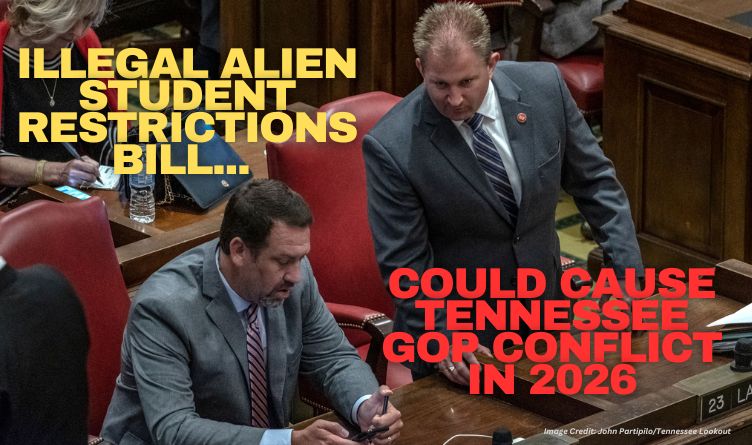Image: A move to bring back a bill to bar immigrant children from attending Tennessee public schools could cause friction between House Republican Caucus Chair Jeremy Faison, left, and House Majority Leader William Lamberth, who sponsored the 2025 measure. Image Credit: John Partipilo/Tennessee Lookout
By Sam Stockard [The Tennessee Lookout -CC BY-NC-ND 4.0] –
Tennessee House Republican leadership could hit an impasse again in 2026 over a measure designed to restrict immigrant student enrollment in public schools.
With the bill on the skids in mid-April at the end of the legislature’s session, House Republican Leader William Lamberth asked the U.S. Department of Education whether $1.1 billion in federal funds would be jeopardized by his bill, which would enable school districts to check students’ immigration status and charge tuition.

Lamberth had not received a response as of May 19, and whether the House moves forward with the bill in January “depends on the response we receive,” House Republican Caucus spokesperson Jennifer Easton said Monday in response to questions from the Lookout.
The Senate version of the bill passed in this year’s session despite public outcry. But if Lamberth continues to push the measure in 2026 as he said he would, he’s likely to run into a conflict with Rep. Jeremy Faison, chairman of the Republican Caucus.
Faison, of Cosby, told WBIR-TV’s “Inside Tennessee” he was a “big fat no” on the legislation and challenged the strategy of trying to put the measure before the U.S. Supreme Court, the Tennessee Journal reported.
Faison backed off his initial statement in which he called the bill a “political stunt,” saying he shouldn’t have questioned the motives of Lamberth, of Portland, and Sen. Bo Watson, of Hixson, who sponsored the bill.
“That being said, I still strongly oppose the state passing a bill that puts children, who have zero decision making power, in the middle of a legal battle,” Faison told the Lookout.
The House version of the legislation would give school districts the option to check students to determine whether they have permanent legal documentation, differing from the Senate version, which would force districts to check students’ immigration status and require tuition.

Faison said Monday he supports President Donald Trump’s efforts to secure the Southern border and wants to see Congress repair the nation’s immigration laws so states don’t have to debate policies dealing with federal issues. Yet, he said he never liked the bill dealing with immigrant students.
Faison reportedly said on WBIR that Attorney General Jonathan Skrmetti told him the U.S. Supreme Court would never take up the immigrant student case, which was designed to overturn a 1982 decision that found all children should be allowed to enroll in public schools no matter their immigration status.
Federal Title VI prohibits discrimination based on race, color or national origins in programs that receive federal funds, and violating the law could put the federal funds in danger, according to a state financial analysis. Those deal with the Every Student Succeeds Act — which measures student success —, the Individuals with Disabilities Act, the Carl Perkins Act — named for the late Kentucky Congressman Carl Perkins, it funds career and technical education — and school nutrition.




One Response
Yup, lucifer’s RINOs, want the illegal magnet to remain.